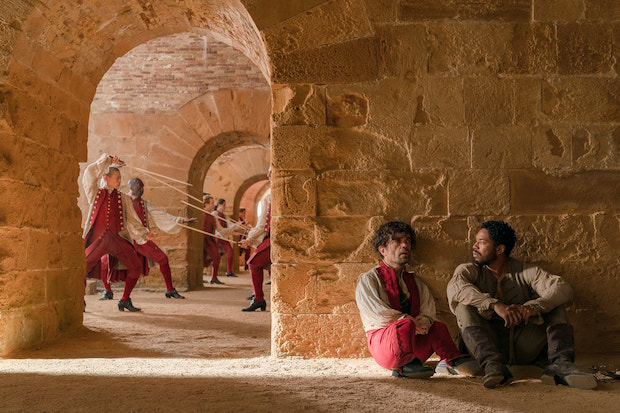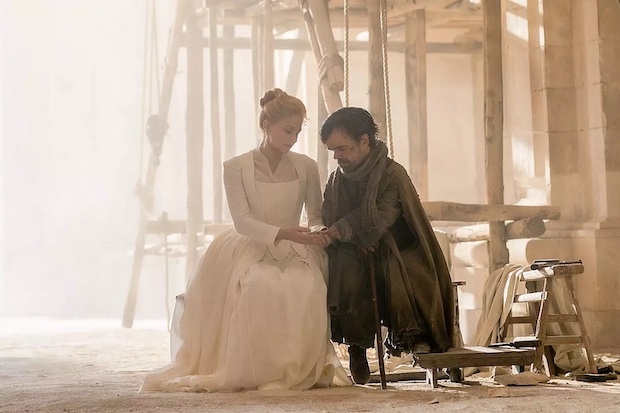Review: Cyrano, Starring Peter Dinklage, Makes a Soaring Transformation to the Screen
Haley Bennett and Kelvin Harrison Jr. also star in Joe Wright’s film adaptation of the musical.

(© Peter Mountain / Metro-Goldwyn-Mayer Pictures Inc.)
What a difference a medium makes! Though I went into the 2019 off-Broadway run of Cyrano a fan of both Edmond Rostand's original 1897 tragicomedy and the music of the indie rock band the National, Erica Schmidt's musical adaptation ultimately struck me as a disappointment. Not even Peter Dinklage's reserves of charisma as the title character could mask an overall impression that Rostand's play wasn't natural musical material, especially with songs that were more memorable for their melancholic vibes than for their melodies, and lyrics that were more earnest than poetic. So it is with a measure of surprise that I now report that Joe Wright's new film version makes a better case for the musical than the off-Broadway production did, and is an impressive achievement on its own terms.
The success of the movie Cyrano actually isn't so surprising if you have even a passing familiarity with Wright's directorial work. With Pride and Prejudice (2005) and Atonement (2007), Wright displayed a knack for directing costume dramas in a way that felt fresh and vital instead of weighed down by prestige. He even dared to take formal chances in such films. Whatever you may have thought, for instance, of his deliberately stagey and artificial Anna Karenina (2012), one could at least give him points for trying something different with time-worn material. If anyone could make Erica Schmidt's Cyrano adaptation play cinematically, it was Wright.

(© Peter Mountain / Metro-Goldwyn-Mayer Pictures Inc.)
For those who missed the off-Broadway production, Schmidt retained much of Rostand's original plot. This Cyrano is still about the eponymous brash cadet and sensitive wordsmith (Dinklage) who pines for Roxanne (Haley Bennett) from afar, too self-conscious about his perceived physical flaws to directly express his love for her. When he discovers, however, that Roxanne yearns for fellow soldier Christian (Kelvin Harrison Jr.), and vice versa, Cyrano decides to help the handsome but relatively crude Christian woo her by passing off his own words as Christian's. The ruse works — and continues to do so even as Cyrano and Christian are thrust into war, leading to ultimately tragic results.
In Rostand's play, Cyrano's chief physical flaw was an oversized nose. In Schmidt's adaptation, it's his diminutive height, corresponding to Dinklage's own physical attributes — which made it strange to still hear references to a big nose in the off-Broadway production. Such rough edges have thankfully been sanded away for the film version, at least in terms of the musical's book. The songs — with music by Bryce and Aaron Dessner, and lyrics by Matt Berninger (the National's lead singer) and Carin Besser — remain pretty but bland as showtunes (though fans of the National might give them a wider berth). More worrying is the fact that, Haley Bennett aside, the singing is only adequate, at best. Even though Dinklage often sounds very much like Berninger does on the National's albums — their baritone vocal ranges are similar — his voice strains to approach Berninger's natural expressiveness even at Cyrano's most openly longing.
And yet, even the music sounds improved in this film version, by virtue of orchestrations grander than what was heard off-Broadway at the Daryl Roth Theatre (Robert Ames is credited with additional orchestrations). And in general, Wright, with the invaluable assist of cinematographer Seamus McGarvey's lush, swooning images (captured on location in Sicily), infuses the whole film with a romanticism that feels like an expression of Cyrano's own aesthetically generous worldview.
In such a context, even the most puzzling choice in the stage production — "Wherever I Fall," in which a trio of secondary soldiers (played in the film by Glen Hansard, Sam Amidon, and Scott Folan) briefly take over the show and sing out their letters to loved ones — makes intuitive sense in the film. If Cyrano, ever the poetic soul, can find beauty in just about everything around him, why not also a certain bleak beauty in men pouring their hearts out as they face possible death on the battlefield?
And for the most part, uneven singing quality aside, the performers certainly help sell anew this tragic tale of a man felled by his own hopeless romanticism. It's too bad Blake Jenner, who played Christian off-Broadway, didn't reprise his role for the film version; he more successfully conveyed sense of the character's likable dimness than the comparably nondescript Harrison here. But Bennett vividly portrays Roxanne's reserves of passion, and she generates credible chemistry with Dinklage in their scenes together. And of course, there's Dinklage at the center, nailing both Cyrano's passion and his ultimately destructive pride. Even when this Cyrano doesn't entirely sing, it somehow manages to soar.








